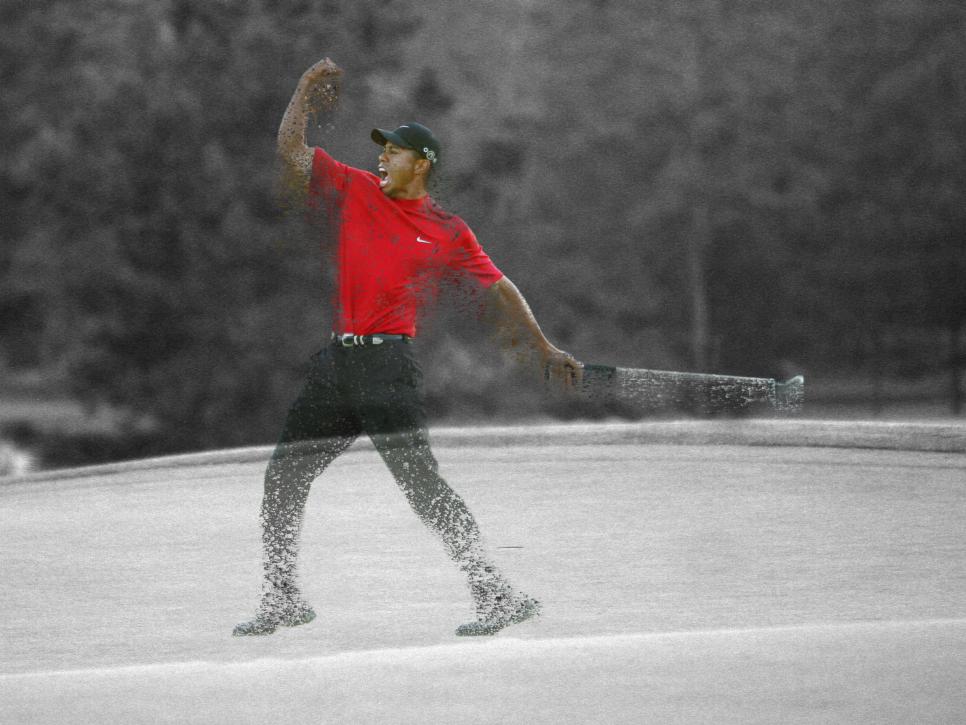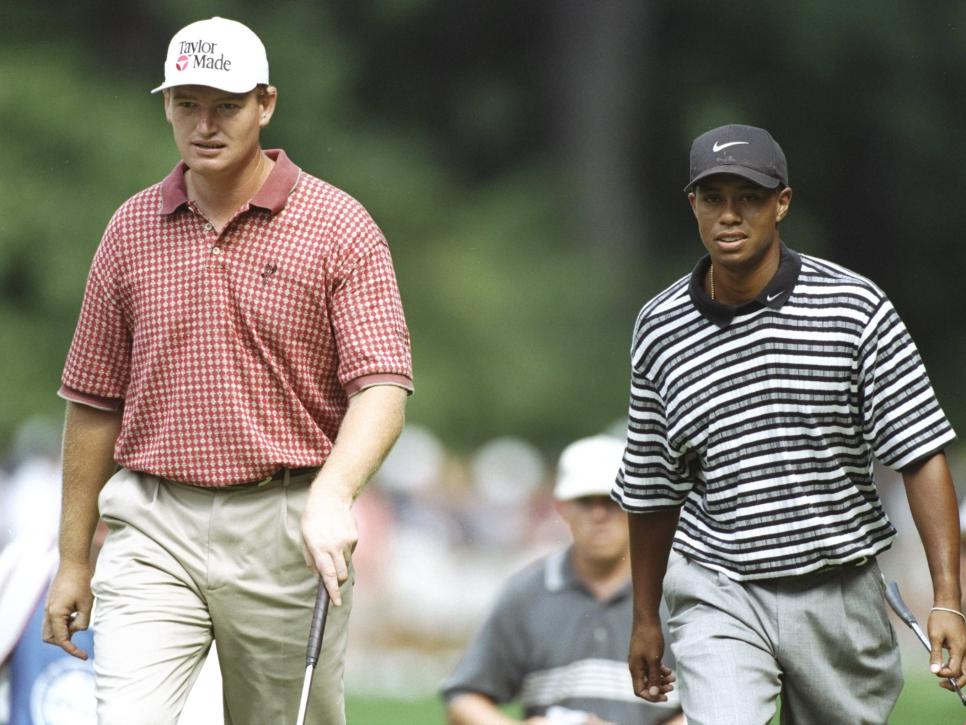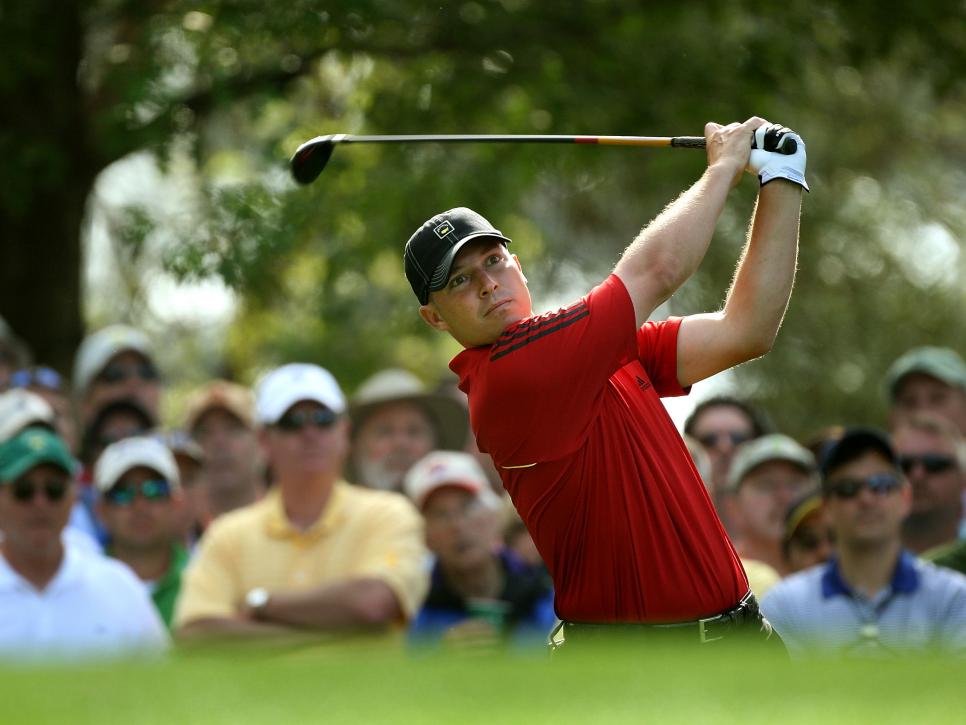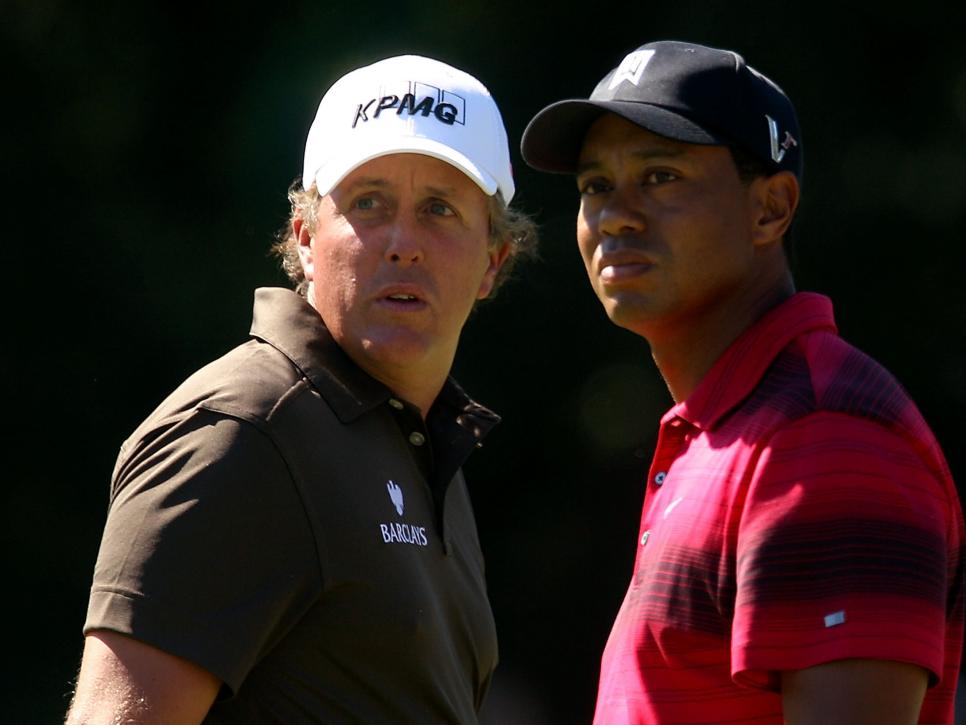News
Whose career is wildly different if Tiger Woods didn't exist?

Golf is not so much our profession as it is our passion at Golf Digest, and often that passion translates to philosophical, analytical, ideological and, occasionally, idiotic workplace discussions about the game. During this time of pause in our sport (and in the world at large), we decided to take these office conversations online in hopes of providing a welcome distraction.
On the panel for today’s discussion are Golf Digest writers Alex Myers, Joel Beall, Chris Powers and Daniel Rapaport.
Beall: “Raiders of the Lost Ark” was on over the weekend, and I stumbled on the part where Indiana Jones discovers the “Well of Souls” in the desert. All I could think was, “Well of Souls” would be a great name for Tiger’s trophy room.
And that got me wondering: If you went back in time and convinced 15-year-old Tiger Woods to give up the game—allowing plenty more trophies to be had by other golfers—which of Tiger’s rivals would have a career trajectory that’s most wildly different?
Myers: Having just written about the 2005 Masters for part of our Masters Rewatch series, my initial reaction is to say Chris DiMarco. The plucky player may have won just three career PGA Tour titles, but he was outdueled by Tiger in two majors, including that one. Giving him credit for those two suddenly vaults him from borderline journeyman to borderline Hall-of-Famer. Poor Chris DiMarco.
Beall: “Poor Chris DiMarco” is a great name for a fantasy team. He was four shots away from winning three majors in an eight-tournament span. Instead he’s relegated to occasional “Morning Drive” appearances. Anytime I delve in his career, which is about six times a year, I come away thinking “Is Rickie Fowler this generation’s Chris DiMarco, with better marketing?”
Myers: That said, I’m going in a different direction with an actual Hall-of-Famer.
While Phil Mickelson is considered Tiger’s closest rival for good reason, I think Ernie Els actually would have benefitted more from Woods’ absence. When Woods arrived on the scene, the South African already had won a U.S. Open and he’d add another at the major directly following Tiger’s landmark 12-shot 1997 Masters victory. That moved Els briefly to World No. 1. More importantly—at least, for the purposes of this argument—Els was a clear No. 2 during Tiger’s epic 2000 season, which started with Woods beating him in that memorable playoff at Kapalua. Then Els finished runner-up to Vijay Singh at the Masters (not Tiger’s fault) and runner-up to Woods at both the U.S. Open and British Open (totally Tiger’s fault).
Yes, Els was a distant second in those two Opens, but again, we’re talking about a golf world in which Woods doesn’t exist. And in that world, Els and Vijay Singh share the lead when it comes to runner-up finishes at the hands of Woods with five apiece. And two of Ernie’s came in majors. Had the Big Easy won both before claiming his first of two British Opens in 2002, that’s an incredible career trajectory that would have been tough for Phil, who didn’t win a first major until 2004, to ever catch. Without Tiger, Els could have gone down as a top-10 golfer of all time. Instead, he played during an era in which he knew even his best golf probably wasn’t going to beat the best player.

David Cannon
Beall: In a non-Tiger existence, Els likely wins more majors ... but if one of those tournaments isn’t the Masters, I’m not sure how much his legacy really changes. Maybe a No. 1 mindset pushes Els over his Augusta hump. Of course, Ernie liked to wrestle on airplanes for sport; it’s not like the guy lacked a killer instinct.
Rapaport: So the answer is Phil, and I really don’t think it’s much of a debate. It’s hard to take issue with a career that yielded 44 wins, five majors and more than $91 million in earnings. But Phil will always, always be remembered as second-fiddle to Tiger. It remains one of the more unbelievable stats in golf that Lefty never reached World No. 1. Not even for one week. It wasn’t always Tiger who kept him from the top spot, but it was usually Tiger. Tom Lehman got to No. 1. So did Luke Donald, and Martin Kaymer, and Adam Scott. But Phil, who spent more than 700 weeks in the top 10? Never.
Without Tiger, Phil is the greatest player of his generation. And knowing that brings an internal sense of superiority that Phil never had. Without Tiger, he’s the top dog, and you have to think that would have spurred him on to even greater greatness. He probably wins at least two more majors, spends years as World No. 1 and wins, say, 12 more Tour events. That would put him at 56 wins and seven majors, and all the sudden he’s a top-five player ever.
Powers: All fair takes boys, very fair takes. But I’m surprised nobody mentioned Sergio Garcia, who has had to deal with Tiger since the beginning of his career. Phil and Ernie each had a brief B.T. (Before Tiger) period prior to his 1997 Masters victory, and the two combined for 12 PGA Tour wins during that time. Even after that, I still think they each got plenty out of their careers, Tiger or no Tiger. Only 29 golfers on the planet have won four or more majors, so it’s not like Tiger robbed Ernie and Phil of legendary status. Without Woods, they each could have absolutely beefed up their resumes, but the resumes are still damn good.
As for Sergio, all he’s ever known is losing to Tiger after Tiger fended him off at Medinah in 1999 and then basically patted him on the head like a good boy the rest of his career. In an alternate universe, a 19-year-old Garcia wins that PGA and gains the confidence needed to capitalize on the countless chances he gave himself going forward. Instead, he lost to Tiger and failed to ever live up to the hype. The argument against this is that in most of Garcia’s future close calls, it was Garcia who beat himself. But Tiger defeating him in ’99 ended up being a pretty good indicator of what was to come.

David Cannon
Beall: It seems obtuse that winning at Medinah wouldn’t shift Sergio to a higher trajectory. Yet so many of Garcia’s shortcomings are self-inflicted, which makes me think it would have stayed exactly the same.
To me, the best origin story is Trip Kuehne. Dude was a three-time college All-American but never played the Tour, trading his clubs for stocks to work for a hedge fund. Why? Well, there’s been a tad of revisionist history around the Kuehne mystique, that he never truly held professional aspirations. But after winning the 2007 U.S. Mid-Amateur, Kuehne admitted he would have gone pro had he won the 1994 U.S. Amateur at TPC Sawgrass. Luckily for Kuehne, he didn’t have to make that decision.
Despite having Tiger 5 down with 12 holes to play in their 36-hole final match at Sawgrass, Kuehne stumbled down the stretch and Woods completed the epic comeback to win the first of this three straight U.S. Am titles. The defeat caused Kuehne to question if had the desire and talent to compete at the next level, coming to the conclusion he lacked both, which is why he chose business school instead of Q school following graduation. While earning his MBA in Stillwater, Kuehne met his future wife in a pick-up basketball game, and ultimately decided to become a financial advisor.
“My whole life would have been different,” Kuehne said at the 2008 Masters. “I wouldn’t be married to the great woman I am today. I would not have my son. I would have turned professional.”
So while I will not argue that Tiger altered the legacies of Phil and Ernie and Sergio, it warrants mentioning a match with Woods was so traumatic it made a guy switch careers.
Powers: Man, no love for Steve Scott, huh? Different debate for a different day.
Beall: Before we go, discounting the generation of players he inspired, did any of Tiger’s peers benefit from his presence?

Scott Halleran
Rapaport: So, about that always-second-to-Tiger thing for Phil? It’s a double-edged sword. Having Tiger seemingly always above him had to be the ultimate motivator.
And it wasn’t just that Tiger held top-dog honors for the entirety of Phil’s prime. It’s that Tiger completely stole his thunder. Our younger readers might not realize just how hyped-up Mickelson was when he turned pro, and rightfully so. He was a three-time NCAA champ and won the 1991 Northern Telecom Open as an amateur, still the most recent win by an amateur on Tour.
He turned pro in 1992 and wins twice in 1993. He was the big thing in golf, the young starlet who every young golfer wanted to be. The next year, Tiger won his first U.S. Am, and three years later the Tiger earthquake had rattled the entire sporting world. That had to irk Phil, and seeing that guy win major after major after major—Tiger had eight before Phil won his first—is a thought that would send anyone to the practice range.
Myers: First off, back to Sergio. I’ve often wondered about how differently his career would have looked had he won at Medinah. He had all the makings of a star, including some serious showmanship with his famed recovery-and-run from the base of a tree. And again, he was 19! Tiger didn’t win a major until he was 21.
That being said, obviously, Sergio, Phil, Ernie and countless others benefited from Woods when it comes to making money as purse size exploded in the Tiger Era. There were years when Mickelson was the second-highest paid athlete in the world behind Woods. Two golfers leading the list! Wild times.
So again, while the trophy rooms of many like Phil took a hit from Tiger, they owed having such nice trophy rooms to Tiger. Well, not Trip Kuehne, because he never turned pro. Man, he really might have been impacted the most …

